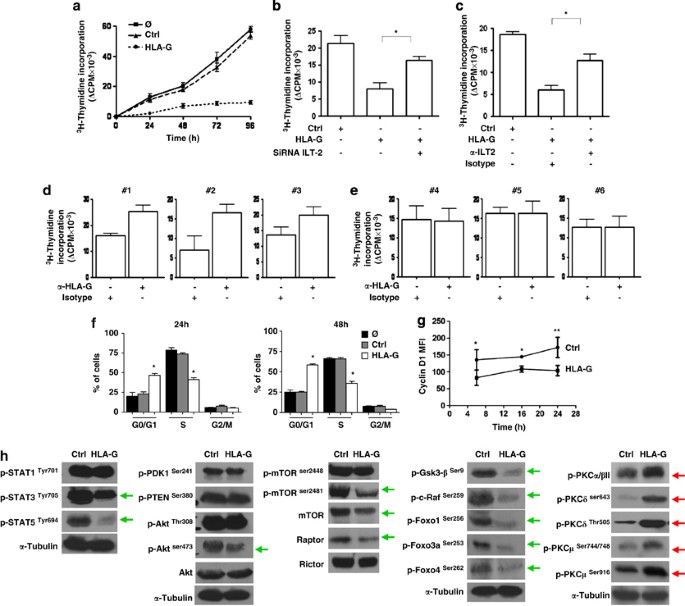Play all audios:
Access through your institution Buy or subscribe Deregulation of B-cell proliferation may induce malignant growth causing various lymphoproliferative disorders including the most prevalent
hematological malignancies in adult, namely lymphoma, multiple myeloma (MM) and B-cell chronic lymphocytic leukemia.1 Inducing depletion through an apoptotic pathway or inhibiting B-cell
proliferation and differentiation constitutes a rational approach to cure B-cell-mediated disorders. One such modality used recently in B-cell malignancies is rituximab, a B-cell-depleting
monoclonal antibody against CD20.2 Nevertheless, efforts to identify novel therapeutic targets remain essential. Like NK, T and antigen-presenting cells, B cells express immunoreceptor
tyrosine-based inhibitory motif bearing receptors such as the leukocyte immunoglobulin-like receptor LILRB1/ILT2/CD85j.3 ILT2 is characterized by a broad specificity for HLA class-I
molecules, with the highest affinity for HLA-G. However, no information is currently available on the role of ILT2 and HLA-G in regulating neoplastic B-cell growth. The biological functions
of HLA-G have been originally described in maternal-fetal tolerance and more recently in allograft acceptance and tumor escape showing evidences for its tolerogenic properties.4 In contrast
to classical HLA-class I, HLA-G is expressed in a limited number of healthy tissues and can be expressed as seven isoforms including four membrane-bound (HLA-G1–HLA-G4) and three soluble
(HLA-G5–HLA-G7) proteins.4 This is a preview of subscription content, access via your institution ACCESS OPTIONS Access through your institution Subscribe to this journal Receive 12 print
issues and online access $259.00 per year only $21.58 per issue Learn more Buy this article * Purchase on SpringerLink * Instant access to full article PDF Buy now Prices may be subject to
local taxes which are calculated during checkout ADDITIONAL ACCESS OPTIONS: * Log in * Learn about institutional subscriptions * Read our FAQs * Contact customer support REFERENCES *
Hideshima T, Bergsagel PL, Kuehl WM, Anderson KC . Advances in biology of multiple myeloma: clinical applications. _Blood_ 2004; 104: 607–618. Article CAS Google Scholar * Dighiero G,
Hamblin TJ . Chronic lymphocytic leukaemia. _Lancet_ 2008; 371: 1017–1029. Article CAS Google Scholar * Colonna M, Navarro F, Bellon T, Llano M, Samaridis J, Angman L _et al_. A common
inhibitory receptor for major histocompatibility complex class I molecules on human lymphoid and myelomonocytic cells. _J Exp Med_ 1997; 186: 1809–1818. Article CAS Google Scholar *
Carosella ED, Moreau P, Lemaoult J, Rouas-Freiss N . HLA-G: from biology to clinical benefits. _Trends Immunol_ 2008; 29: 125–132. Article CAS Google Scholar * Menier C, Guillard C,
Cassinat B, Carosella ED, Rouas-Freiss N . HLA-G turns off erythropoietin receptor signaling through JAK2 and JAK2 V617F dephosphorylation: clinical relevance in polycythemia vera.
_Leukemia_ 2008; 22: 578–584. Article CAS Google Scholar * McCubrey JA, Steelman LS, Abrams SL, Bertrand FE, Ludwig DE, Basecke J _et al_. Targeting survival cascades induced by
activation of Ras/Raf/MEK/ERK, PI3K/PTEN/Akt/mTOR and Jak/STAT pathways for effective leukemia therapy. _Leukemia_ 2008; 22: 708–722. Article CAS Google Scholar * Wang X, Yue P, Kim YA,
Fu H, Khuri FR, Sun SY _et al_. Enhancing mammalian target of rapamycin (mTOR)-targeted cancer therapy by preventing mTOR/raptor inhibition-initiated, mTOR/rictor-independent Akt activation.
_Cancer Res_ 2008; 68: 7409–7418. Article CAS Google Scholar * Martelli AM, Evangelisti C, Chappell W, Abrams SL, Basecke J, Stivala F _et al_. Targeting the translational apparatus to
improve leukemia therapy: roles of the PI3K/PTEN/Akt/mTOR pathway. _Leukemia_ 2011; 25: 1064–1079. Article CAS Google Scholar * Ketroussi F, Giuliani M, Bahri R, Azzarone B, Charpentier
B, Durrbach A . Lymphocyte cell-cycle inhibition by HLA-G is mediated by phosphatase SHP-2 and acts on the mTOR pathway. _PLoS One_ 2011; 6: e22776. Article CAS Google Scholar * Selmani
Z, Naji A, Zidi I, Favier B, Gaiffe E, Obert L _et al_. Human leukocyte antigen-G5 secretion by human mesenchymal stem cells is required to suppress T lymphocyte and natural killer function
and to induce CD4+CD25highFOXP3+ regulatory T cells. _Stem Cells_ 2008; 26: 212–222. Article CAS Google Scholar Download references ACKNOWLEDGEMENTS This research was supported by the
Commissariat à l’Energie Atomique et aux energies alternatives. We thank Drs N Mooney and JC Bories for providing us with the B-cell malignant cell lines. We thank Florent Montespan and
Chantal Schenowitz for technical help. AUTHOR INFORMATION Author notes * A Naji and C Menier: These authors contributed equally to this work. AUTHORS AND AFFILIATIONS * CEA, Institut des
Maladies Emergentes et des Therapies Innovantes (iMETI), Service de Recherche en Hemato-Immunologie (SRHI), Hopital Saint-Louis, Paris, France A Naji, C Menier, G Maki, E D Carosella & N
Rouas-Freiss * Univ Paris Diderot, Sorbonne Paris Cite, UMR E_5 Institut Univ.Hematologie, Hopital Saint Louis, Paris, France A Naji, C Menier, G Maki, E D Carosella & N Rouas-Freiss
Authors * A Naji View author publications You can also search for this author inPubMed Google Scholar * C Menier View author publications You can also search for this author inPubMed Google
Scholar * G Maki View author publications You can also search for this author inPubMed Google Scholar * E D Carosella View author publications You can also search for this author inPubMed
Google Scholar * N Rouas-Freiss View author publications You can also search for this author inPubMed Google Scholar CORRESPONDING AUTHOR Correspondence to N Rouas-Freiss. ETHICS
DECLARATIONS COMPETING INTERESTS The authors declare no conflict of interest. ADDITIONAL INFORMATION Supplementary Information accompanies the paper on the Leukemia website SUPPLEMENTARY
INFORMATION SUPPLEMENTARY FIGURE 1 (PPT 373 KB) SUPPLEMENTARY FIGURE 2 (PPT 216 KB) SUPPLEMENTARY DATA (DOC 35 KB) RIGHTS AND PERMISSIONS Reprints and permissions ABOUT THIS ARTICLE CITE
THIS ARTICLE Naji, A., Menier, C., Maki, G. _et al._ Neoplastic B-cell growth is impaired by HLA-G/ILT2 interaction. _Leukemia_ 26, 1889–1892 (2012). https://doi.org/10.1038/leu.2012.62
Download citation * Published: 05 March 2012 * Issue Date: August 2012 * DOI: https://doi.org/10.1038/leu.2012.62 SHARE THIS ARTICLE Anyone you share the following link with will be able to
read this content: Get shareable link Sorry, a shareable link is not currently available for this article. Copy to clipboard Provided by the Springer Nature SharedIt content-sharing
initiative

